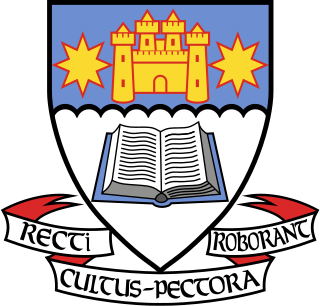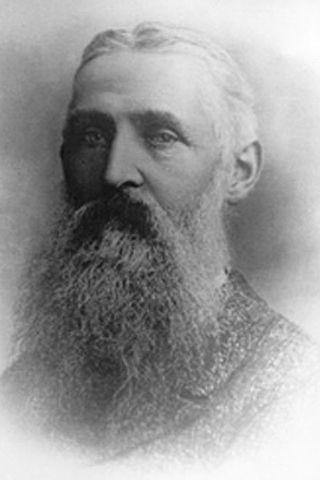Related Research Articles

Otago Boys' High School (OBHS) is a secondary school in Dunedin, New Zealand. It is one of New Zealand's oldest boys' secondary schools. Originally known as Dunedin High School, it was founded on 3 August 1863 and moved to its present site in 1885. The main building was designed by Robert Lawson and is regarded as one of the finest Gothic revival structures in the country. Situated on high ground above central Dunedin it commands excellent views of the city and is a prominent landmark.

The Main South Line, sometimes referred to as part of the South Island Main Trunk Railway, is a railway line that runs north and south from Lyttelton in New Zealand through Christchurch and along the east coast of the South Island to Invercargill via Dunedin. It is one of the most important railway lines in New Zealand and was one of the first to be built, with construction commencing in the 1860s. At Christchurch, it connects with the Main North Line to Picton, the other part of the South Island Main Trunk.

Allied Press is an independent New Zealand media and publishing company based in Dunedin. The company's main asset is the Otago Daily Times, New Zealand's oldest daily newspaper. Allied Press has a number of other daily and community newspapers and commercial printing operations throughout the South Island including the Canterbury–based media company Star Media. It also formerly operated Dunedin's regional television station, Channel 39.

Sir William Jukes Steward was a New Zealand politician and the first Liberal Speaker of the New Zealand House of Representatives. He represented South Canterbury electorates in Parliament for a total of 34 years, before being appointed to the Legislative Council. He served briefly on the Otago Provincial Council and was Mayor of Oamaru for three years.

Dunedin North is a former New Zealand parliamentary electorate, which returned one Member of Parliament (MP) to the New Zealand House of Representatives. It was established for the 1905 election and has existed since. It was last held by David Clark of the New Zealand Labour Party, who replaced the long-standing representative Pete Hodgson. It was considered a safe Labour seat, with Labour holding the seat for all but one term (1975–1978) since 1928. In the 2020 electoral boundary review, Otago Peninsula was added to the area to address a population quota shortfall; with this change the electorate was succeeded by the Dunedin electorate in the 2020 election.

William Hutchison was a New Zealand politician and journalist. Hutchison and his son George were both Members of Parliament.

Waitaki is an electorate for the New Zealand House of Representatives that crosses the boundary of North Otago and South Canterbury towns on the East Coast of the South Island. The electorate was first established for the 1871 election that determined the 5th New Zealand Parliament. It has been abolished and re-established several times and in its early years was a two-member electorate for two parliamentary terms. The current electorate has existed since the 2008 election and is held by Miles Anderson of the National Party.
The 1963 Chatham Cup was the 36th annual nationwide knockout football competition in New Zealand.
City of Dunedin, during the first two parliaments called Town of Dunedin, was a parliamentary electorate in Dunedin in Otago, New Zealand. It was one of the original electorates created in 1853 and existed, with two breaks, until 1905. The first break, from 1862 to 1866, was caused by an influx of people through the Otago gold rush, when many new electorates were formed in Otago. The second break occurred from 1881 to 1890. It was the only New Zealand electorate that was created as a single-member, two-member and three member electorate.
Oamaru was a parliamentary electorate in the Otago region of New Zealand, during three periods between 1866 and 1978.

Samuel Edward Shrimski was a 19th-century Member of Parliament and then a Member of the Legislative Council from Otago, New Zealand.
Hugh Joseph Finn was a 19th-century Member of Parliament in the Otago region of New Zealand.

Robert Gillies was a 19th-century Member of Parliament in Otago, New Zealand. He was born in Rothesay on the Isle of Bute, Scotland.

Charles Stephen Reeves was a New Zealand businessman and former Mayor of Dunedin.
Frederick Ridley Dennison (1876–1960) was an Oamaru mechanical engineer who designed and built New Zealand's first indigenous motor car in 1900 and first bus in 1906.
David Murdoch was a New Zealand farmer, storekeeper and politician. He was appointed a member of the New Zealand Legislative Council on 22 June 1950.
The Oamaru by-election 1885 was a by-election held in the Oamaru electorate during the 9th New Zealand Parliament, on 20 May 1885. The by-election was caused by the resignation of the incumbent, Samuel Shrimski, who was appointed to the Legislative Council, and was won by Thomas William Hislop.
William John Dyer was a New Zealand businessman and politician. Born in London, his family moved to Sydney when he was a child. He ran a trading business between Sydney, New Zealand and the Pacific Islands, and moved to New Zealand in 1857. He lived at different times in Dunedin and Milton and entered politics, contesting a number of elections and representing the Tokomairaro electorate in the provincial council.
The 1862 City of Dunedin by-elections were three by-elections held in the City of Dunedin electorate in Dunedin following three resignations.

John Bradley Shacklock was a New Zealand iron founder and politician. He served as mayor of Dunedin from 1914 to 1915.
References
- ↑ "Meeting of Mr Reeves supporters". Otago Daily Times. No. 5427. 11 July 1879. p. 3.
- ↑ "Dunedin Election". Oamaru Mail. Vol. IV, no. 1009. 15 July 1879. p. 2.
- ↑ "The City Election". Evening Star. No. 5102. 12 July 1879. p. 4.
- ↑ "Dunedin Election". Oamaru Mail. 15 July 1879.
- ↑ "Meeting of Mr Reeves' Supporters". Otago Daily Times . No. 5427. 11 July 1879. p. 3. Retrieved 12 January 2019.